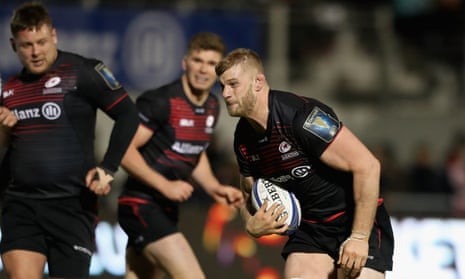Saracens were awarded the freedom of the borough of Barnet last week but there will be no civic reception for them in Leicester on Christmas Eve when they meet a team whose thirst for victory is almost as great.
Saracens this decade supplanted Leicester as England’s most successful club but a graph that has largely been an upward curve since 2009, apart from a few blips, has fallen sharply in the last seven weeks and the European champions travel to Welford Road on a run of seven defeats in all competitions.
Their last victory was against London Irish in October, leaving Mark McCall dealing with his first lingering bout of adversity since he took over as the club’s director of rugby in the middle of the 2010-11 campaign. Yet he treats a bad run no differently to a winning one, never one to get overtaken by emotion.
“We all know we are going to get through this patch,” he says, “whether that is at Leicester or against Worcester at Allianz Park the week after. We’ll get through this little period and our aim is to get ourselves into a qualifying position for the Champions Cup and finish in the Premiership top four.”
Saracens’ slump started with two bonus-point defeats to Harlequins and Sale in the Anglo-Welsh Cup – international call-ups and injuries testing even their resources. They then threw away winning positions to lose by six points or fewer to Gloucester, Exeter and Harlequins before being thumped at home by Clermont Auvergne.
They recovered to lose to a late penalty in France six days later, but it is the 46-14 home defeat to Clermont that stands out in the run. Saracens, who pride themselves on their defence, conceded six tries and looked like a team that had met in the car park an hour before kick-off. There were extenuating circumstances: the match had been hastily rearranged after being called off the day before, fewer than 3,000 spectators turned up and Clermont overdosed on indignation having had their views on the kick-off time, 5.30pm on a Monday night, overlooked by the organisers.
“We were written off by many people but we defended much better in Clermont and played some good rugby,” McCall says. “We were much more like ourselves but we did not win and there is much more to come. The players backed each other on the field and we have to make that happen again at Welford Road.”
The Tigers are also looking to arrest a slump having lost their last four matches, against Worcester and Wasps in the Premiership and to Munster home and way in the Champions Cup. It is a league fixture that over the years has tended to be one-sided: from the beginning of 2001 until May 2010, Saracens won only three times, but Leicester have triumphed in only four of the sides’ last 17 league meetings.
Their recent home record against Saracens, though, is one defeat in four and that was at the start of the year in what turned out to be Richard Cockerill’s final match as the Tigers’ director of rugby. They started the latest round of matches, which marks the halfway point in the regular season, in sixth, three points and three places behind Saracens having won and lost the same number of matches.
Saracens’ four league defeats have been uncharacteristic in that they have surrendered second-half leads each time. There is usually no side harder to play catch-up against than McCall’s team but they not only blew a lead at Bath in September with four minutes to go but left without a bonus point and they were ahead going into the final quarter at Gloucester. They led Exeter at Allianz Park with eight minutes to go and conceded a try to Harlequins two minutes from time to lose by a point.
“Part of being a successful team is that you have ups and downs,” says George Kruis, the England and Lions second-row. “We are fortunate at Saracens in that we are able to be honest with each other and there have been plenty of conversations. We showed in the second match against Clermont just what playing for the clubs means to us. We said in the dressing room after that we still have so much more to give.”
It was against Leicester that Saracens confirmed their transition from English rugby’s most inconsistent team to a major force. They beat them in the 2011 Premiership final at Twickenham, a year after losing to the Tigers late on in the showpiece, and, even on Christmas Eve, Welford Road will be crammed as two of the game’s drawcards look to correct their stumble.
